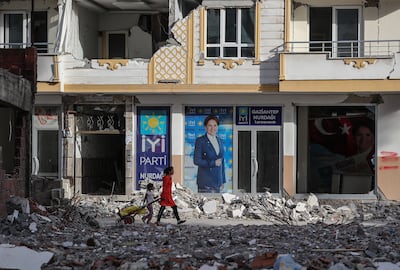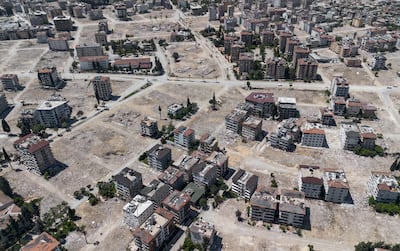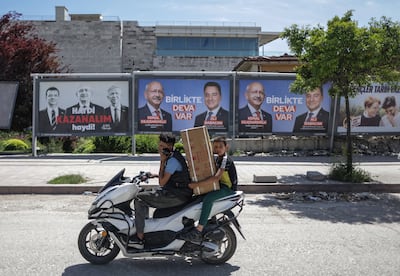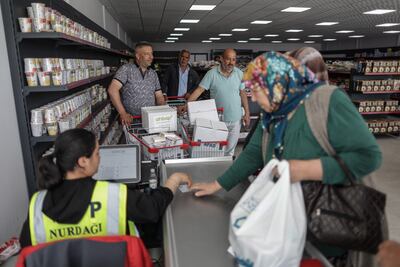The three months that have passed since devastating earthquakes laid waste to cities across southern Turkey have seen progress towards President Recep Tayyip Erdogan’s promise to “rebuild from the ground up”.
The scale of the task ahead, however, remains no less daunting after the clearing of rubble and the unveiling of new housing.
Rebuilding the earthquake zone is taking place as Turkey faces elections on May 14 and the effect of the disaster on voting behaviour has been widely debated. Polls show the race could be the toughest of Mr Erdogan's 20-year rule.

The economic cost of the February 6 quakes is estimated at $103.6 billion, or about 10 per cent of Turkey’s GDP. The cost, revealed in a March report from the presidency’s strategy and budget office, covers damage to buildings, infrastructure, industry, insurance and the ensuing macroeconomic impact.
Then there is the human cost. The most recent official estimate is that 50,783 people lost their lives in an area covering 110,000 square kilometres, which is roughly the size of Bulgaria.
About 3 million people initially fled the 11 provinces hit by the disaster, leaving more than 300,000 buildings destroyed or unsafe. It is unclear how many have returned.
In the days immediately after the disaster, Mr Erdogan pledged to repair the destruction within a year — a commitment that seemed fanciful given the mammoth reconstruction effort and expenditure required.
On April 22, the President unveiled the first new homes — 10 village houses in Nurdagi, close to the epicentre in Kahramanmaras province.
“We’ve started the construction of more than 105,000 houses and completed the ground-breaking of almost half of them,” Mr Erdogan said.

He has promised to rebuild 650,000 homes, including 319,000 within a year. The new buildings will be no more than four storeys and located on ground that will mitigate the effects of future tremors.
But the government’s timetable seems unrealistic and some say it has underestimated the magnitude of reconstruction.
Reconstruction and prevention
Burcu Aydin Ozudogru, a director at the Tepav think tank in Ankara, said the earthquakes would have “a significant and long-term negative impact on the Turkish economy, especially on growth, employment, inflation, fiscal and financial accounts, wealth and poverty”.
Tepav estimated the cost of the recovery will reach $150 billion over a five-year period and slow Turkey’s economic growth by 1.2 per cent this year.
The earthquakes have also focused attention on other at-risk parts of the country, notably Istanbul, Turkey’s mega-city of 16 million. With about 90,000 structures at risk of collapse should a big tremor hit, the city needs to spend at least $19 billion to fortify its building stock, according to Mayor Ekrem Imamoglu.
In a report released this week, Turkey’s Chamber of Architects said reconstruction and recovery efforts have failed to address the need to protect public health, create safe living conditions and meet essential needs.

It also said that reconstruction projects worth billions of lira had been allocated without following procurement laws.
“By ignoring public and legal supervision, the planning and zoning process in the region began to be restructured, focusing on the transformation of public resources, cities, natural and cultural utilities into investment instruments,” the report said.
The international community, meanwhile, has rallied to provide financial support.
At an EU donors’ conference in March $7.69 billion was pledged for reconstruction, including $1 billion for Syria. The European Bank for Reconstruction and Development and the World Bank have offered loans worth a total of $3.4 billion.
The question remains how Turkey will make up the shortfall. Mr Erdogan’s unconventional economic policies and the erosion of the rule of law have scared off foreign investors and any foreign borrowing would attract high rates.
Hard-hit domestic banks are already struggling to cope with a series of measures forced on them by the government in a bid to buoy the faltering economy.
Compounding a dire economic situation, the cost burden of the earthquakes and Turkey’s reliance on overseas financing to rebuild homes, factories, roads and most other aspects of life has led to questions about the country’s status in the world.
Mr Erdogan has long championed the view of Ankara as a global leader, steering its own course in international affairs and offering an alternative to European and US leadership.
“There’s nothing wrong with asking for help in a time of need,” said Namik Tan, Turkey’s former Washington ambassador who is standing as an opposition parliamentary candidate in this month’s election.
“But it was scarcely a few months before the earthquakes that we were bragging about how Turkey ‘provided the most humanitarian aid in the world [based on per capita income]'.
“Now we hear from our government that the least developed countries have been digging into their pockets for us. Now we see our own near bankruptcy, heretofore skilfully concealed, poking its ugly head out.”

The most heavily affected provinces, with the exception of Hatay, are under the control of the ruling Justice and Development Party (AKP). How Mr Erdogan’s supporters will react to the government’s post-earthquake policies at the ballot box will not become apparent until election day.
“I think many AKP voters would agree with the point that the government was ill-equipped and insufficient in its response, especially within the first 72 hours,” said Berk Esen, assistant professor of political science at Sabanci University in Istanbul.
“That doesn’t mean that it’s going to lead to a major electoral decline for the party in the region but I think it was a heavy blow and it’s already impacted the AKP government economically.
“They were planning to distribute more resources in the lead up to the election and the earthquake simply suffocated those efforts and depleted their resources, which is why the regime has become even weaker than it otherwise would have been.”

